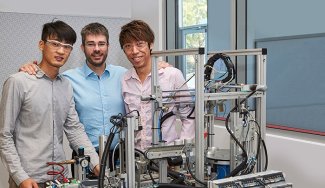

Why choose this course?
Enhance your specialist skills in heating, ventilation and air conditioning (HVAC) systems with this qualification. Our focus is to design HVAC systems to ensure optimal human comfort and health in the places we live, work, and play, all while maintaining a sustainable impact on the environment.
The advanced diploma has selected elective units that will assist in a HVAC specialisation. During your studies you will learn about the principles of fluid dynamics, thermodynamics, central plant operations, applied psychrometrics, electronics, programming, workplace communications, sustainability, and energy management. Furthermore immerse yourself in cutting-edge areas such as building information modelling and computer-aided drafting and design.
You will be guided by our skilled team of lecturers who are experienced industry professionals as you are trained in designing and implementing today's computer-controlled HVAC systems for residential and commercial settings.
Empower your career by acquiring the credentials to become a proficient problem-solver in HVAC systems, ensuring utmost human comfort and health. Elevate your engineering prowess to a supervisory level, driving innovation and fostering optimal environments for all.
Please note: The MEM60122 Advanced Diploma of Engineering (BIW5) will replace the MEM60112 Advanced Diploma of Engineering in Heating, Ventilation, and Air Conditioning. Additionally, it's important to note that the Carlisle campus does not presently possess accreditation from Engineers Australia (EA).
Career opportunities
- Associate Engineer
- Detailed Drafter
- Maintenance Technician
-
An IELTS score (academic) of 6.0 with no band score less than 5.0 or equivalent.
-
Completion of MEM50222 Diploma of Engineering - Technical is required for entry into this course.
There may be further semester intakes available for enrolment. You can view any further intakes when you submit your online application(opens in a new tab).
For information about pathways from TAFE to university, view our Pathways to university page.
How to apply
Apply to study at TAFE in six steps:
- find a course;
- check entry requirements;
- submit an application;
- accept your offer and pay;
- apply for your student visa; and
- receive your visa and come to Australia for your studies.
Build your own course guide
Select the study areas, courses and topics you like. Get your custom guide by email!
Download study area guide(opens in a new tab)
Contact us(opens in a new tab)
TAFE International Western Australia (TIWA) is the Registered Training Organisation (RTO) and Commonwealth Register of Institutions and Courses for Overseas Students (CRICOS) provider, for the delivery of training to international students, enrolled in a TAFE course in Western Australia. This nationally recognised course is delivered by a Western Australian TAFE college on TIWA's behalf. TIWA retains responsibility for the quality of the training and assessment delivered by the TAFE colleges and for the issue of certification documentation to students.

